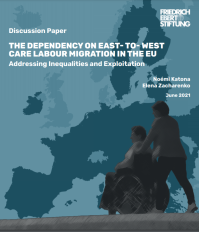
Katona, Noémi – Zacharenko, Elena (2021) The dependency on East - to - West Care labour migration in the EU. Addressing Inequalities and Exploitation. Discussion paper. Budapest: Friedrich Ebert Foundation.
http://library.fes.de/pdf-files/bueros/budapest/18038.pdf
Excerpt from the discussion paper:
"Providing live-in care in a private household involves hard working conditions for care workers. It entails various risks, including a higher dependency on the employer, exploitation, isolation and excessive working hours without rest time. Despite various attempts to provide legal and fair working conditions in live-in care, the sector is often still unregulated and consequently in thegrey or black market. Even in countries where this sector is legally regulated, exploitative working relations still prevail.
The 24 hour live-in care work is an unsustainable arrangement: if decent working conditions, in particular legal working time limits, were to be maintained, many more care workers would be required for each care recipient. Therefore, in the long term the EU and member states will need to provide different solutions to fulfil long-term care needs. At the same time, in the short term, there is an urgent need for an adequate EU-level policy that takes into account the regional imbalances between the destination countries and countries of origin of care workers within the EU, centring on the needs of the workers themselves. The EU should ensure opportunities for professionalisation, such as training or accreditation; fair regulation of working hours for care workers; monitoring of working conditions on the care market; and access to workers’ rights.
This discussion paper summarises the most important structural problems that characterise the live-in care market and policymaking at the national level. In addition to better functioning EU-level regulation, adequate and sustainable financing of long-term care and quality care implemented by the state are essential in order to find a long-term solution to meeting the care needs of everyone in the EU."

